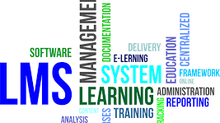It's the 21st Century, people: Let's get social.
- Dylan Hedges
- Jun 29, 2017
- 4 min read
In my humble opinion, I think social learning is one of those topics that seems to come and go in our industry. I remember this being more of a "thing" when people of all ages became more comfortable with the various social platforms that extended beyond just Facebook.
Back then, I always thought it would be so cool to integrate social technologies in corporate training, and was often told things like "Michelle, cool doesn't cut it.", or "it's not a learning thing, Michelle, it's just a cool thing." Well, social learning is back and has once again become a hot trend in L&D. And yes - I'll be the first to a it is a cool thing, I'll also add, that it's not just a cool thing. The concept of social learning isn't a new method of training. Introvert or not, learning is inherently social and is one of the oldest forms of learning for humankind. And regardless of demographic or technology, we learn more from our peers compared to any method of training combined. The definition of social learning has changed in recent years as it relates to how we learn in the workplace. By definition, social learning is the continuous process of gaining knowledge through people. However, in this specific context, it's defined by learning from our colleagues through informal channels such as wikis, blogs, forums and other social technologies. Today's organization are progressively looking for new ways to advance skillsets and improve agility in the way their company operates. Social learning is a fundamental component to learning that offers a plethora of value to those companies who embrace it.
Benefits of social learning in the workplace According to a report from Bersin by Deloitte, organizations of at least 10,000 employees spend three times more on social tools than they had in the past two years. And according to another report from The Brandon Hall Group, 73% of surveyed organizations expect to increase their focus on social learning over the next year. Companies who've invested in such a collaborative-centric approach to learning, have environments that foster collaboration between learners across the organization. 1. Employees have more control over their learning These days, taking our training outside the workplace has become more common. It's easy for us to complete our regulatory training over a frap at the Starbucks down the street, or on the bus during our commute home - and that's the main benefit of supporting a social learning environment in the workplace: It empowers employees to take more accountability and control as to how their training gets done.
2. Supports continuous training Over the past years, businesses have been looking for ways they could make learning more continuous throughout an employee's career. Companies wanted their staff to engage with learning tools more frequently. With the use of social apps, blogs, or even a simple intranet site, businesses have been able to leverage these tools as a means of providing more content, allowing employees to learn exactly what they need with little interruption to their workflow.
3. Enhanced corporate culture As humans, we're naturally social beings. So, fostering an environment that's conducive to social learning can reinforce that natural need to feel we're part of a group. Learners are able to support their peers and be supported by their peers. This in turn motivates them to pay that learning forward to other employees across the organization.
Ways to use social media in the workplace Chances are you know your way around every social media platform under the sun. But knowing how this can be leveraged for learning is another thing. Here are a few common tools organizations have integrated into their social learning environment.
1. Social Media Platforms Organizations have asked their SMEs across several segments to create a dedicated social media group / page on platforms such as LinkedIn and Facebook, as a means of sharing and communicating their knowledge with their peers. Using these types of tools, allows colleagues to interact with peers who share the same career goal or learning. The use of social media platforms can also be helpful to gain insight or feedback, and can also be used to monitor the overall interaction.
2. Forums Most LMS and SharePoint sites consist of forums or chat features, which can be used to facilitate online discussions. You could post a question regarding a current trend or concern in the workplace, inviting participants to share their ideas and insights. Though it's recommended that appropriate guidelines are put in place beforehand, using forums is a great way to jumpstart discussions around relevant topics that exists within the workplace.
3. Video Videos are becoming a preferred method of learning and unlike blogs, wikis and forums, videos allows you to share knowledge across an organization very fast and effectively. Companies have created a library of videos aimed to their employees (as well as consumers) on platforms such as YouTube as a means of educating them about their products and services.
4. Blogs Learning and Development departments often write articles about topics they believe their organization would be interested in learning about. In my personal opinion, I believe blogs are the best tools to use when it comes to social learning because you can honestly do it all: videos, discussions, sharing infographics and so forth. It provides a centralized location of learning but you really have to know who your audience is and the type of content your sharing. Some businesses puts more effort around creating social learning for their consumers that they may actual need an Instagram, LinkedIn, and YouTube account. Be mindful of your audience, the content and the purpose of sharing it before you deciding on an appropriate method.
Social learning will become more common as technology continues to advance, and chances are you've probably been incorporating these elements into your L&D strategy without even knowing it! Stay connected and talk to us about your social learning strategy. Our experienced team of learning professionals are happy to share their knowledge on how you can leverage these tools to create a social learning environment for your organization.
#eLearningToronto #customeLearningdevelopmentCanada #virtualrealityeLearningToronto #topCanadianeLearningcompany #customtrainingcompany #eLearningcompanyCanada #CorporateTraining #PathwaysTrainingandeLearningInc #Pathways #Captivate9foreLearningdevelopment #LearningProfessionals #LDTrends #LearningTrends #2017LearningTrends #EdTools #SocialLearning #LearningDevelopmentTrends2017 #CoolTraining #WorkplaceCulture #SocialLearningEnvrionment































Comments